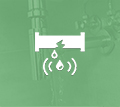Dealing with a Leaking Water Heater: Causes, Solutions, and Prevention

Common Causes of Water Heater Leaks
Corrosion: Corrosion of the tank’s inner lining or fittings can lead to leaks. This is more common in older water heaters.
Pressure and Temperature Relief Valve (PTR Valve) Issues: A malfunctioning PTR valve, designed to release pressure, can lead to leaks if it’s not operating correctly.
Faulty Drain Valve: The drain valve at the bottom of the tank can leak if it’s loose, damaged, or not properly sealed.
Sediment Buildup: Sediments in the water tank can accumulate over time, causing the tank to overheat and develop leaks.
Solutions for Dealing with Water Heater Leaks
Turn Off the Power and Water Supply: If you notice a leak, immediately turn off the power supply (for electric heaters) or the gas supply (for gas heaters). Then, shut off the water supply to prevent further leakage.
Check PTR Valve: Test the pressure and temperature relief valve by lifting its lever slightly and allowing some water to discharge. If water continues to flow, the valve may be faulty and require replacement.
Tighten or Replace Drain Valve: If the leak comes from the drain valve, try tightening it. If it’s damaged, replacing it might be necessary.
Inspect for Corrosion: If the leak is due to corrosion, you may need to replace the water heater. Corroded tanks can’t be reliably repaired.
Preventive Measures to Avoid Water Heater Leaks
Regular Maintenance: Schedule annual water heater maintenance. Flushing the tank to remove sediment buildup and checking for signs of wear and tear can prevent leaks.
Anode Rod Replacement: The anode rod inside the tank protects it from corrosion. Regularly inspect and replace this rod to extend your water heater’s lifespan.
Proper Temperature Settings: Set the water heater’s temperature to 120°F (49°C) to prevent excessive pressure buildup and reduce the risk of leaks.
Professional Inspection: Have a professional plumber from 1st Choice Plumbing, Flood & Restoration inspect your water heater periodically. They can identify potential issues and address them before they lead to leaks.
When to Seek Professional Help
In some cases, water heater leaks require professional intervention:
Major Corrosion: Extensive corrosion indicates a compromised tank. A professional from 1st Choice Plumbing, Flood & Restoration can assess whether replacement is necessary.
PTR Valve Malfunction: A malfunctioning PTR valve can be dangerous. A plumber can diagnose the issue and replace the valve if needed.
Persistent Leaks: If you’ve attempted DIY solutions and the leak persists, professional help is essential to prevent further damage.
Conclusion
Dealing with a leaking water heater demands swift action and preventive measures. By understanding the causes, implementing solutions, and following preventive practices, you can extend your water heater’s lifespan, save on repair costs, and avoid water damage in your home. If in doubt or facing persistent leaks, always seek the expertise of a professional plumber by calling 866-437-0205. Remember, a well-maintained water heater ensures a reliable hot water supply and contributes to your household’s overall comfort and safety.









